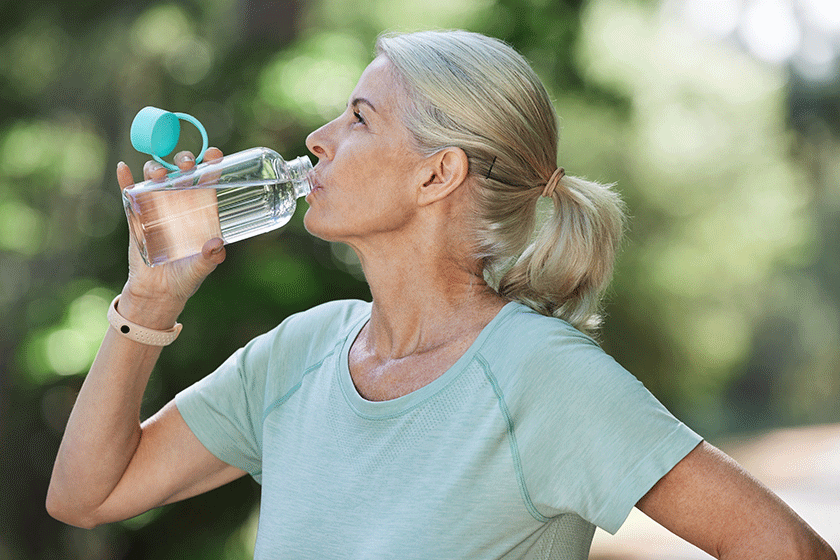Proper hydration plays a crucial role in maintaining health, particularly as we age. Drinking water and aging are closely connected, with studies showing that staying well-hydrated can significantly affect your overall well-being. Understanding the impact of hydration on aging can help you and your loved ones adopt healthier habits to support longevity and vitality.
The Role of Hydration in Biological Aging
Hydration is essential for slowing down the biological aging process. According to a study by the National Institutes of Health (NIH), adults with higher serum sodium levels, which indicate lower fluid intake, showed signs of advanced biological aging. These individuals were more likely to develop chronic conditions such as heart and lung diseases.
Maintaining optimal serum sodium levels is vital for overall health. Proper hydration helps regulate these levels, ensuring that your body’s systems function efficiently. For older adults, this means reduced risks of developing age-related diseases and complications.
Preventing Chronic Diseases
Adequate water intake is a key factor in preventing chronic diseases. The NIH study revealed that individuals with optimal hydration had a lower risk of developing heart failure, stroke, diabetes, and dementia. Drinking water supports cardiovascular health, metabolic function, and cognitive performance, all of which are critical for healthy aging.
For your loved ones aging in place or residing in a retirement community, staying hydrated can prevent dehydration-related issues. This simple yet effective habit can improve their quality of life by reducing the likelihood of chronic illnesses and promoting overall health.
Physical Health Benefits
Hydration significantly impacts physical health, especially for older adults. Drinking enough water ensures proper joint lubrication, muscle function, and skin elasticity. These benefits are crucial for maintaining mobility and reducing discomfort associated with aging.
Proper hydration also aids digestion and nutrient absorption. Water is important in order to break down food before it is transported as nutrients throughout the body. For older adults, this can improve digestive efficiency and overall nutritional health.
Cognitive and Mental Benefits
Staying hydrated is not only important for physical health but also for cognitive and mental well-being. Dehydration can lead to confusion, difficulty concentrating, and other cognitive impairments. Ensuring that your family member drinks enough water can help maintain their cognitive abilities and support mental sharpness.
Proper hydration can also improve mood and emotional well-being. Dehydration is linked to increased feelings of fatigue, anxiety, and depression. Keeping hydrated can help your loved ones feel more energetic and positive.
Tips for Staying Hydrated
Encouraging older adults to drink more water can sometimes be challenging. Here are some practical tips to help maintain hydration:
- Set Regular Reminders: Use smartphone apps or alarms to remind your loved ones to drink water throughout the day.
- Flavor Enhancers: Adding a splash of natural fruit juice or a slice of lemon can make water more appealing.
- Hydrating Foods: Incorporate water-rich foods like cucumbers, watermelon, and oranges into their diet.
- Accessible Water: Ensure that water is readily available and easily accessible at all times.
- Consistent Routine: Encourage drinking a glass of water with every meal and snack.
These strategies can help older adults maintain their hydration levels and enjoy the associated health benefits.
Recognizing Dehydration Signs
Identifying signs of dehydration is crucial for timely intervention. Common symptoms include dry mouth, fatigue, dizziness, and dark-colored urine. Severe dehydration can lead to confusion, rapid heartbeat, and fainting.
In a retirement community or at home, caregivers and family members should monitor for these signs and encourage regular fluid intake. Early detection and intervention can prevent serious health issues and ensure the well-being of your loved ones.
Scientific Research on Hydration and Aging
The connection between hydration and healthy aging is supported by extensive research. The Atherosclerosis Risk in Communities (ARIC) study, which tracked health data from over 11,000 adults over 30 years, provides valuable insights into the benefits of proper hydration. The study found that optimal serum sodium levels correlate with lower risks of chronic diseases and slower biological aging.
Furthermore, guidelines from the National Academies of Medicine recommend that men consume 8-12 cups (2-3 liters) of fluids daily, and women consume 6-9 cups (1.5-2.2 liters) to maintain health. These guidelines help ensure adequate hydration and support overall well-being.
Promoting Hydration in Retirement Communities
Promoting hydration at home and in retirement communities is essential for the health and happiness of older adults. Simple measures such as providing easy access to water, offering hydrating foods, and encouraging regular fluid intake can make a significant difference.
Educational programs about the importance of hydration can also help residents understand the benefits of drinking water. By fostering a supportive environment, retirement communities can enhance the quality of life for their residents.
Maintaining Hydration for Healthy Aging
Maintaining proper hydration is essential for healthy aging. Drinking enough water supports physical health, cognitive function, and emotional well-being. For older adults, especially those living in retirement communities, staying hydrated can significantly enhance their quality of life.
By understanding the impact of hydration on the aging process, you can help your loved ones adopt healthy habits that promote longevity and vitality. Encouraging regular water intake and providing access to hydrating foods and beverages are simple yet effective ways to support their health.







